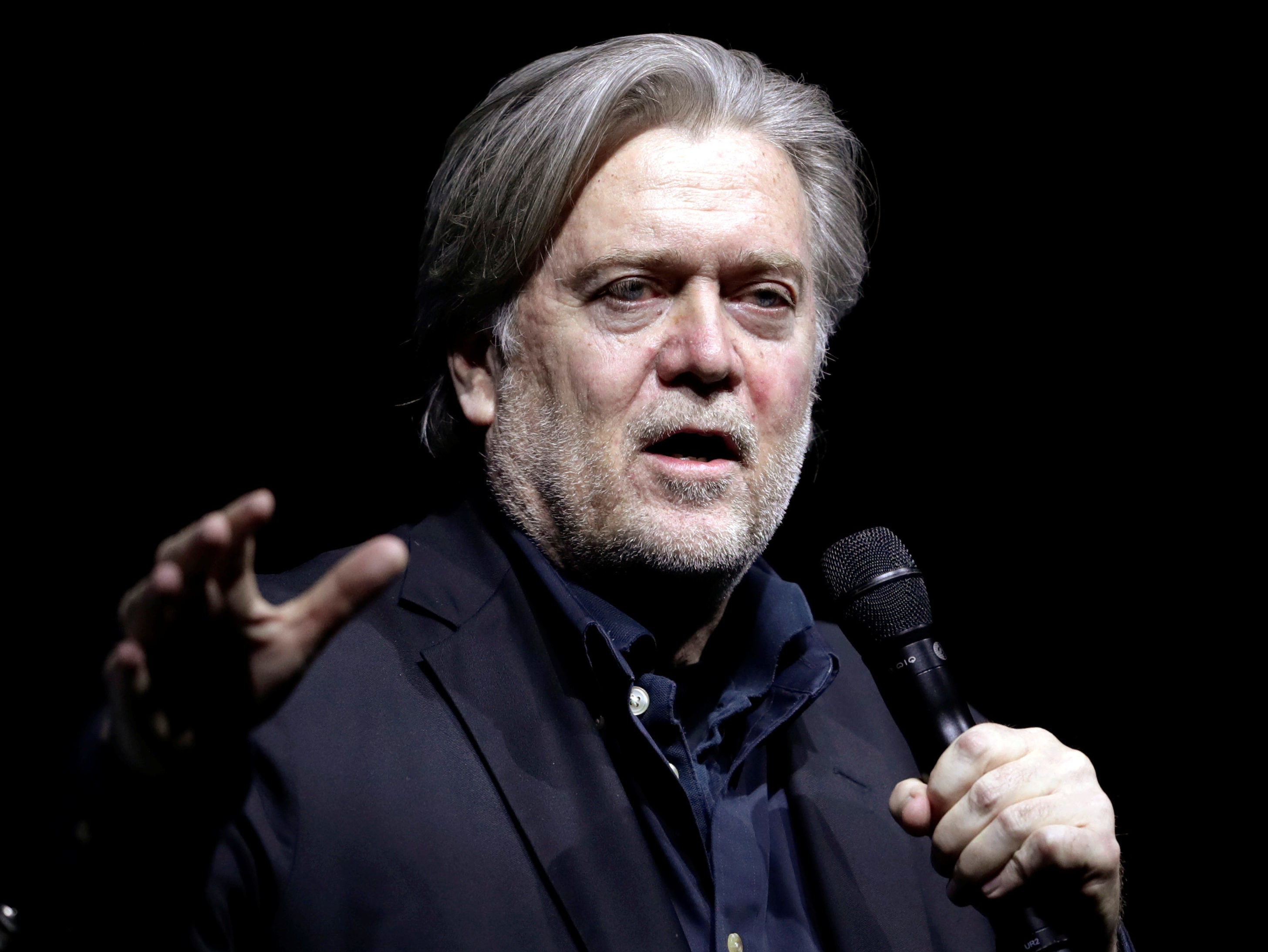
The Economist has stood by its decision to invite Donald Trump’s former chief strategist Steve Bannon on stage, saying it is important to subject ideas from all sides to “rigorous questioning and debate”.
The weekly news magazine, which turns 175 this year, will host its Open Future Festival on 15 September with speakers set to appear on stage in London, New York and Hong Kong in a rolling 24-hour event.
Bannon, the former chairman of right-wing news website Breitbart, is due to appear at the New York event in conversation with Economist editor-in-chief Zanny Minton Beddoes in a debate on the future of liberalism.
Defending Bannon’s invitation, Minton Beddoes said in a statement last night: “The future of open societies will not be secured by like-minded people speaking to each other in an echo chamber, but by subjecting ideas and individuals from all sides to rigorous questioning and debate.
“This will expose bigotry and prejudice, just as it will reaffirm and refresh liberalism.”
Other speakers are set to include former Labour politician David Miliband, Monika Bickert, Facebook’s head of product policy and counterterrorism, and actress Amber Heard.
The Economist faced calls to cancel Bannon’s appearance this week after the New Yorker bowed to similar pressure.
The US magazine was met with a backlash when it announced on Monday that editor David Remnick would interview Bannon as part of its annual festival in October.
Actor Jim Carrey said he could “never” be on the same programme as Bannon, while director Judd Apatow, also scheduled to speak, said he would “not take part in an event that normalises hate”.
In a statement issued the following day, Remnick said he had “reconsidered” after hearing the objections from readers and staff and discussing the issue with colleagues.
“There is a better way to do this,” he said.
“Our writers have interviewed Steve Bannon for The New Yorker before, and if the opportunity presents itself I’ll interview him in a more traditionally journalistic setting as we first discussed, and not on stage.”
However Remnick also responded to the “main argument” against engaging with Bannon – “that we are giving him a platform and that he will use it, unfiltered, to propel further the ‘ideas’ of white nationalism, racism, anti-Semitism, and illiberalism”.
“…to interview Bannon is not to endorse him,” he said. “By conducting an interview with one of Trumpism’s leading creators and organisers, we are hardly pulling him out of obscurity.
“Ahead of the mid-term elections and with 2020 in sight, we’d be taking the opportunity to question someone who helped assemble Trumpism.”
Journalist Laurie Penny was scheduled to be among the speakers at The Economist’s London event, but announced on Monday that she would not appear unless the decision to host interview Bannon was reversed.
She tweeted: “I was honoured to be invited by The Economist to speak as part of their prestigious Open Future convention – but I cannot in good conscience appear at an event which chooses to dignify a neo-nationalist like Steve Bannon. Unless this decision is reversed, I will not be attending.
“It looks like an otherwise wonderful event and everyone needs to make their own decision, but I strongly encourage other attendees and speakers to consider doing the same. Freedom of speech does not require us to dignify bigots with the honour of a keynote.”
Minton Beddoes confirmed last night that The Economist’s invitation to Bannon would stand, saying: “Mr Bannon stands for a world view that is antithetical to the liberal values The Econmist has always espoused. We asked him to take part because his populist nationalism is of grave consequence in today’s politics.
“He helped propel Donald Trump to the White House and he is advising the populist far-right in several European countries where they are close to power or in government.
“Worryingly large numbers of people are drawn to nativist nationalism. And Mr Bannon is one of its chief proponents.”
She also cited the magazine’s founder, James Wilson, who said in 1843 that its mission was to take part in “a severe contest between intelligence, which presses forward, and an unworthy, timid ignorance obstructing our progress”.
She added: “Those words have guided us for 175 years. They will guide our debates at the Open Future Festival on 15 September. That is why our invitation to Mr Bannon will stand.”
Financial Times editor Lionel Barber said the difference between the decisions of the New Yorker and The Economist created an “interesting commentary about the role of journalism as seen on both sides of the Atlantic”.
Earlier this year he also stood by a decision to invite Bannon to an FT Future of News event in New York despite critical social media posts.
Writing afterwards about the purpose of an interview, Barber said: “Now, in my near 40 years in journalism, I have interviewed many people of questionable character.
“As editor, I have sat down with strongmen such as Paul Kagame of Rwanda, Alvaro Uribe of Colombia and Vladimir Putin of Russia. Each might be said to have blood on their hands. At times, all have defended their or their affiliates’ actions, as a necessary response to genocidal killers, narco-traffickers or enemies of the Russian state.
“At no point have I applied a political litmus test to potential interviewees. It would never have occurred to me. But these are extraordinary times, when polarisation has reached new heights and liberal democracy itself appears under siege.”
He added: “…interviews are also, in the words of John Birt, the former director-general of the BBC, a chance to ‘test people’s account’. This could be probing a version of events or a political philosophy.
“In the case of Steve Bannon, the ex-US navy lieutenant, Goldman Sachs banker and Hollywood film producer turned incendiary political strategist, all categories apply.”
Picture: Reuters/Moritz Hager
Email pged@pressgazette.co.uk to point out mistakes, provide story tips or send in a letter for publication on our "Letters Page" blog

